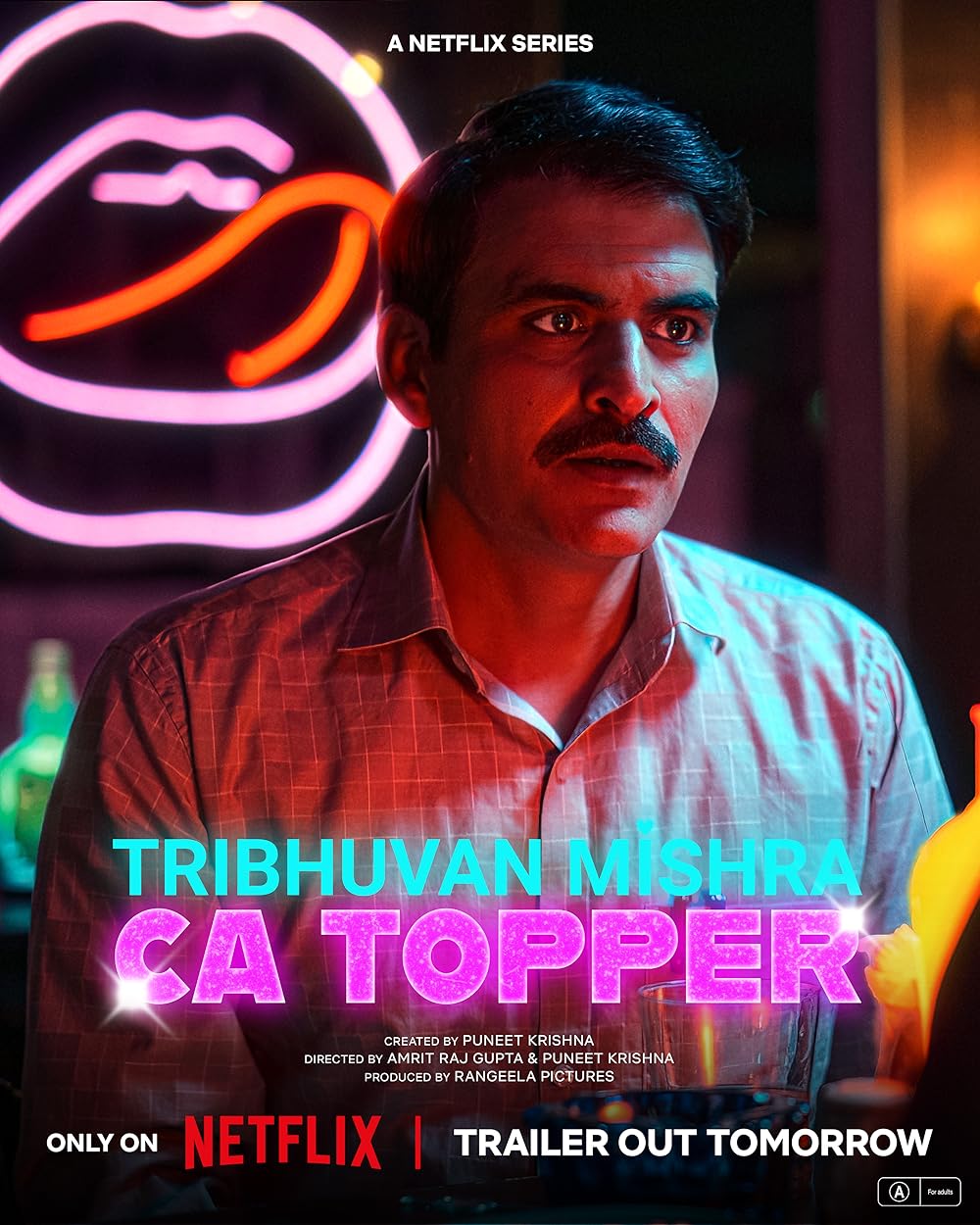Netflix’s latest release, Tribhuvan Mishra CA Topper, is a unique and refreshing addition to the growing world of web series. The series centers on Tribhuvan Mishra, played compellingly by Manav Kaul, who is a topper in the CA exam and an ordinary man well-established in his government job, steadfastly refusing to succumb to the pressures of corrupt builders. His refusal to take bribes earns him the tile of ‘Chugad‘ (fool) from everyone around him which makes him immensely sad and forces him to rethink his ideologies.
Despite his humble and shabby home, Mishra’s life is filled with the happiness and contentment shared with his wife and kids.
Despite his humble and shabby home, Mishra’s life is filled with the happiness and contentment shared with his wife and kids. His wife, a struggling home baker, battles daily with her microwave, but she tries to remain happy because she is aware of her husband’s values.
Mishra is portrayed as a man of unwavering honesty and integrity, valuing the rules and principles he lives by. His personal life is depicted by warmth, as he knows exactly how to make his wife happy, both emotionally and intimately. Her appreciation for him is highlighted in her praise, ‘You really know what a woman wants,‘ a sentiment echoed throughout the series.
At work, Mishra is shy and avoids unnecessary interactions with women, yet he shares a special friendship with Lalithaji, who delights in his wife’s ‘bengan ka bharta.’ This bond serves as a invigorating reminder that not all male-female friendships need to be sexualised, countering the typical portrayal of such friedships by Indian media.
Disaster strikes as the bank holding Tribhuvan’s life savings and loan money is suddenly shut down by the RBI, shattering his world. His plans to help his parents to repair their house fall apart, as he can no longer withdraw the needed funds. At the bank, amidst a protesting crowd, Mishra faces brutal lathi charges from the guards, receiving blow after blow. His friends and family begin to mock his integrity and loyalty.
Mishra’s world further crumbles when even his wife in the face of adversity, calls him ‘Chugad‘.
Mishra’s world further crumbles when even his wife in the face of adversity, calls him ‘Chugad‘. Seeking solace, Mishra goes to a bar with some old friends from college who set him up with a female escort. True to his character, Mishra makes no move and bluntly informs the escort that he is a married man and will not engage with her in exchange for money. The escort gets annoyed and during her conversation with Tribhuvan, reveals that she earns Rs 15,000 an hour and Rs 60,000 or even more for a whole night. Mishra is shocked to realise that even after tax deductions; he would never make such money.
Back home, Mishra searches the internet for ‘males giving sex earning cash‘ and stumbles upon the free-joining website Dil Desire.Com. He opens an account with the username as ‘CA Topper‘ and anxiously waits for his first DM.
Tribhuvan Mishra CA Topper: Initiating conversations on forbidden topics
We see Tribhuvan Mishra going to the Madhur Milaap lodge where his first client Desi Ghoda has invited him to meet. As the hotel door opens, Mishra realises Desi Ghoda is a man, who is similarly shocked seeing him. The man realises he has been duped. After having some conversation, Mishra learns that the man is an escort too. Mishra seeks advice from him on entering the profession as a male escort and tips on pleasing women. It is settled that in return for advice, Desi Ghoda will take a cut from Mishra’s earnings. Desi Ghoda’s advice focuses on how women appreciate honesty, and he asks Mishra to write in bold letters: ‘This is the only business that does not discriminate: caste, religion, colour, age, weight.‘
Desi Ghoda’s advice focuses on how women appreciate honesty, and he asks Mishra to write in bold letters: ‘This is the only business that does not discriminate: caste, religion, colour, age, weight.‘
Mishra begins his journey as an escort, constantly struggling with his moral values. At first meetings, he can barely look at his female clients and would not accept money because he could not provide any service here his values reflect once more. Slowly, as he gains confidence, Mishra’s clients open up to him, sharing their deepest insecurities, tales of emotionally unavailable husbands, and experiences as survivors of domestic violence. Some even request simple acts of intimacy, like sitting beside them and helping them apply nail polish.
Snippets from the show offer an intriguing portrayal of how men can be so absent in perceiving the needs of women within a patriarchal society. Mishra follows these requests with sincerity, his smile ready to serve his clients. His actions reiterate Desi Ghoda’s advice: ‘Your action is equal to client’s satisfaction‘, making women feel safe and comfortable in his presence.
Men, take note: listen to what women want in terms of pleasure
As Tribhuvan Mishra’s business takes off, his confidence blossoms. Women come to him with all kinds of requests that turn them on, some asking for musk ittar, some for V-shaped underwear like Superman, and some for floral shirts. Mishra’s self-assurance and demeanor improve, catching the attention of his office colleagues. He becomes more confident in talking to them and starts asserting boundaries with his manager. Tribhuvan Mishra stands out as a figure completely different from the typical portrayal of Indian men in acts of intimacy. While pop culture often reinforces patriarchal practices, Tribhuvan Mishra is a green flag, as the internet would say.
While pop culture often reinforces patriarchal practices, Tribhuvan Mishra is a green flag, as the internet would say.
Mishra is keen to listen to women’s needs, his services catering to women across the boundaries of religion, caste, and color. His female clients pay him generously, allowing his home to regain its shine, and he even gifts his wife a new microwave oven. This series is a crucial depiction that women are not just objects of sexual pleasure but have their own desires, which they navigate with their own agency of choice. In a society that teaches men to be in charge of sexual acts, Tribhuvan Mishra is a refreshing example of how to listen to what women want.
Most portrayals depict women as being on the receiving end of pleasure, with women’s anatomy often misunderstood and construed as complicated. Research has shown a gender gap in orgasms between men and women, with explanations often relying on essentialist, biological assumptions that men are anatomically easier to please than women. Mishra’s character challenges these stereotypes by demonstrating that understanding and fulfilling women’s desires can be achieved through empathy, respect, and active listening in intimate relationships.
Women’s agency over their sexuality and pleasure in Tribhuvan Mishra: CA Topper
The series introduces another intriguing character, Raja Bhai, whose real name is Teeka Ram Jain. Played by the amazing Shubhjyoti Barat, Teeka Ram is a gangster hiding under the guise of a halwai (confectioner). He uses his confectionery business as a cover for his underground activities. Despite his complex double life, Raja Bhai is completely clueless about his wife’s desires and pays no heed to her simple request to dance with her to Bollywood songs. His wife, Bindi, brilliantly portrayed by Tilottoma Shome, adds depth to the narrative, highlighting the often overlooked emotional needs and desires of women in patriarchal setups.
Bindi is a lively woman who finds joy in old Bollywood music and is unashamed in expressing her desires to her husband. However, she is met with an uninterested Teeka Ram Jain, who dismisses her requests, telling her to grow up and let go of her childlike whims. Teeka Ram is so disconnected from his wife’s life and interests that he assumes Bindi has no desires or wants of her own. Bindi, understanding that her husband does not value her as a human being and is completely uninterested in her as a person, seeks the services of Tribhuvan Mishra.
As the events unfold, Bindi becomes deeply connected and emotionally invested in Mishra, and they begin to meet frequently. By now, Mishra is a seasoned professional, continuing to please women according to their wishes. Throughout the series, we never see Mishra using any form of force or pressure on his clients; he even returns money if he has not provided the service. However, his relationship with his wife faces challenges as other issues begin to crop up, putting his family’s and children’s lives in danger.
Is sex work a woman’s domain? Breaking stereotypes and stigmas
In another episode, the series tackles the deep-seated stereotypes surrounding sex work. Tribhuvan Mishra is caught in a police raid and fumbles anxiously while his client handles the situation with the police under the table. The police officer, assuming the woman is the escort, chastises her, saying, ‘Where are your values and morals, madam? If you are so interested in making money, try something respectable.’
The woman, visibly annoyed, points at Tribhuvan and clarifies that he is the one here to make money, which shocks the police officer. This scene uses humour to cleverly highlight how women are often stereotyped as the only gender that practises sex work and underscores the stigma and societal disdain that sex work faces in a patriarchal society. The portrayal challenges these stereotypes and calls attention to the unfair judgments and prejudices that sex workers endure, making it a significant commentary on gender and societal norms.
Tribhuvan Mishra CA Topper is an engaging watch that disrupts established notions of toxic masculinity prevalent in Indian society and reinforced by pop culture. While some episodes may feel a bit dragged, the series’ fast pace keeps the audience engaged. The show’s focus on prioritising female pleasure and presenting a form of masculinity that challenges traditional views on sex and women is refreshing and thought-provoking.
It offers a nuanced exploration of gender dynamics, making it a compelling narrative for those interested in progressive depictions of intimacy and respect. This series offers an engaging perspective on female sexuality and women’s agency to initiate sex on their terms. In a country where men often receive sex education from their peer groups and roles of sex workers/escorts are predominantly associated with women, this Netflix web series features dialogues that encourage society to rethink how they discuss women and pleasure. Through its nine episodes, the series challenges and debunks various stereotypes, making it an engaging, compelling, and thought-provoking watch.









You really justified cheating?? Used terms like “Patriarchy” and “Toxic masculinity” in literally every other paragraph which doesn’t even relate to that subject just to demean men?? I thought your “feminism” was about uplifting females by providing equality but your article was all about how a cheating man cheats with other cheating women despite being married basically you’re provoking others to cheat if they can’t get pleasure in a relationship
straight up misandry